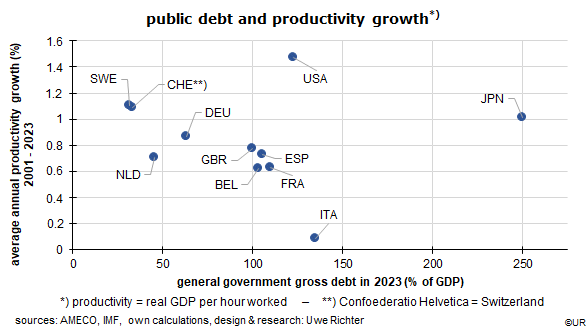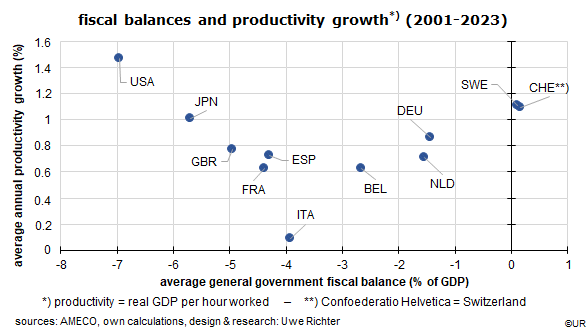
Market Commentary: The German debt brake – so far a mostly counterproductive policy instrument
Everything has already been said about the debt brake – but not by everybody, as the Bavarian poet Karl Valentin might have said. Here is my contribution: the main goal of fiscal policies is not to achieve certain budget deficits or debt levels but to promote economic growth and general welfare, in a way that is perceived as fair, in particular with regard to the distribution of income and wealth. The structure of government spending and taxation should reflect these priorities. If this is the case fiscal policies are on the right track, almost no matter what is happening to budget deficits.
Government debt as such is neither good nor bad as we quickly learn when we look around the world: the U.S., for instance, had an average aggregated deficit of 7% of nominal GDP annually since the year 2001 which has driven the public debt ratio to about 120% of GDP, far above the 60% Maastricht target of the European Monetary Union. At the same time, productivity, defined as real GDP per hour worked, has grown at an average rate of 1.5% and thus almost twice as fast as Germany’s (0.85%) – Germany’s low debt ratio (62%) has not been reflected in brisk productivity growth.
Even Japan, notorious for its structurally large government budget deficits and a debt ratio that has reached no less than 250% of GDP, has outperformed Germany in terms of long-term productivity growth (1.0%).

In other words, Germany has not yet been rewarded for its relatively restrictive fiscal policies in terms of productivity growth. Just going by the numbers, fiscal austerity seems to act as a brake on growth. On the positive side, nominal long-term rates are the lowest in the currency union – and are consistently lower than in the U.S. (presently by more than 200 basis points). Interest expenses have a very low share in overall government spending.
Germany has thus actually a larger room for maneuver, both on the revenue and spending side, than countries with higher debt levels. Given that the economy has de facto stagnated over the past five years, that the crisis has now reached the labor market, while a recession is now looming, it would be possible, and necessary, to launch a major growth initiative, with a focus on education, R&D, infrastructure and smart and humane immigration policies. For years, opportunities have been missed in these areas. Rather than discussing the pros and cons of the debt brake (Schuldenbremse) it is time to act and get rid of the various deficiencies of the economy. There is no lack of money.

Since Germany is part of the euro area, it is instructive to have a look at the exchange rate. Both the U.S. and Japan have flexible exchange rates and can afford large government debt levels – they can start printing money whenever they want and cannot become insolvent. The countries of the euro area have fixed exchange rates among themselves and cannot adjust them. They are in a situation that is comparable to that of the 16 German Länder (states). The smaller the political entity, the less room for debt-financed policies.
For Germany and the other countries of the currency union, the long-term solution can only be a fully integrated capital market and fiscal policies that resemble those of a nation state. So far, there is little enthusiasm to take this road. In a recent series of lectures at the Collège de France, Peter Sloterdijk has argued that the EU is actually a club of losers which are still preoccupied with coming to terms with the loss of their various empires. For the foreseeable future they are not prepared to get serious about the further advancement of the European project. Europe does not have a vocal advocate.
So it’s no wonder that the euro is so weak, in spite of a large surplus in the aggregated balance on current account of the euro area and relatively low government deficits and debt. The U.S., on the other hand, continues to enjoy the benefits of the rule of thumb which is presently driving the action on FX markets: expansionary fiscal policies lead to rising government debt, which causes inflation expectations to rise, which leads to higher interest rates which then leads to an appreciation of the dollar. Impressive, but not what we have learned at school.
To conclude, it looks unlikely that disciplined fiscal policies are the road to more prosperity. Other factors are more important.
###
About Wermuth Asset Management
Wermuth Asset Management (WAM) is a Family Office which also acts as a BAFIN-regulated investment consultant.
The company specializes in climate impact investments across all asset classes, with a focus on EU “exponential organizations” as defined by Singularity University, i.e., companies which solve a major problem of humanity profitably and can grow exponentially. Through private equity, listed assets, infrastructure and real assets, the company invests through its own funds and third-party funds. WAM adheres to the UN Principles of Responsible Investing (UNPRI) and UN Compact and is a member of the Institutional Investor Group on Climate Change (IIGCC), the Global Impact Investing Network (GIIN) and the Divest-Invest Movement.
Jochen Wermuth founded WAM in 1999. He is a German climate impact investor who served on the steering committee of “Europeans for Divest Invest”. As of June 2017, he was also a member of the investment strategy committee for the EUR 24 billion German Sovereign Wealth Fund (KENFO).
Legal Disclaimer
The information contained in this document is for informational purposes only and does not constitute investment advice. The opinions and valuations contained in this document are subject to change and reflect the viewpoint of Wermuth Asset Management in the current economic environment. No liability is assumed for the accuracy and completeness of the information. Past performance is not a reliable indication of current or future developments. The financial instruments mentioned are for illustrative purposes only and should not be construed as a direct offer or investment recommendation or advice. The securities listed have been selected from the universe of securities covered by the portfolio managers to assist the reader in better understanding the issues presented and do not necessarily form part of any portfolio or constitute recommendations by the portfolio managers. There is no guarantee that forecasts will occur.
Read the full article in PDF format here: English.